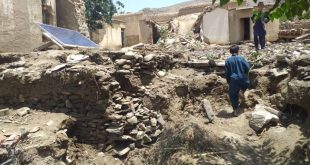By Akhtar M. Nikzad-KABUL: Political analysts and economists in a monthly gathering of the Rana Think Tank termed the joint regional energy projects including CASA-1000, TUTAP, KUNAR, TAPI and ATGP important for expansion of political and economical ties among the regional countries, especially AfPak relations.
Secretary-General of New Beginning Network (NBN) Alias Wardak said that Afghanistan has the potential to produce 23,000MW electricity from water, 222,000MW from solar and 68,000MW from wind sources. He said that currently the government uses only 1.4 percent of its hydropower potential and had not benefited from solar and wind sources.
He added that country produces less than 300 MW from domestic source (mainly hydropower and if we consider the thermal plants, then from Diesel). The mining sector and industry would require much more, but this cannot be estimated for the time being, as we don’t have the required ECONOMIC STRATEGY which defines the direction of our economy in the next decades. However, the Power Sector Master Plan estimated the peak demand for the year 2032 to 3,500 MW. But in order to provide more reliable figures on the demand, a proper evaluation of the requirements, based on the ECONOMIC Strategy (Will AFG focus on provision of services, heavy industry or agriculture?) is required.
“Currently, Afghanistan provides 22 percent of the required energy from its resources and imports around 78 percent energy from neighboring counties. It shows that Afghanistan’s energy sector is not sustainable and dependent on Central Asia,” he said.
Alias furthered that Pakistan needs 22,000MW electricity, but producing only 17,000MW, thus, needing 5,000MW further. “Due to shortfall of electricity in Pakistan, people, industries and agriculture sector are immensely suffering. Pakistan provides 34 percent of its energy through diesel generators and spends 50 percent of its revenue on purchasing petroleum products,” he maintained.
According to him, annually electricity demand growth rate in Pakistan is 10 percent and electricity supply growth rate is 7 percent.
Based on statistics issued by the Pakistani government, the country would need more than 45,000MW electricity by 2030. Pakistan urgently needs regional cooperation to get energy from Central Asia through Afghanistan, he pointed out.
Hinting to the Central Asia South Asia (CASA-1000) power project, Wardak said that supply of 1,000MW power from Kyrgyzstan and Tajikistan to Pakistan via Afghanistan as well as 300MW electricity to Afghanistan would improve political and economical ties between Islamabad and Kabul.
He said that CASA-1000 would complete within five months (summertime) at a total cost of $1.17 billion. The World Bank (WB), Islamic Development Bank (IDB), European Investment Bank (EIB) and USAID will support the project. The project will be completed by 2020 and Afghanistan will get annually $46 million in transit fee.
TUTAP
Turkmenistan-Uzbekistan-Tajikistan-Afghanistan-Pakistan (TUTAP) was another regional project discussed in the session. The purpose of TUTAP is transfer of thermal and hydro power from Turkmenistan-Uzbekistan-Tajikistan to Afghanistan and Pakistan.
Participants of the meeting said that this project would cost $1 billion and the Asian Development Bank (ADB) is working to develop the infrastructure necessary to promote trade in electricity between these countries committed to support the project. It is expected that the project to complete by 2020.
Kunar hydropower project
Providing details on the hydropower project, Alias Wardak said that feasibility study of the project was completed in 2008, adding that this project will have the capacity to produce 789MW electricity and it is expected to complete by 2025, estimated to cost $2 billion.
“The project will meet the domestic energy demand and it will also supply some electricity to Pakistan. The World Bank showed willingness to support the process technically. The project will increase revenues, energy security and will build trust between the two countries,” he mentioned.
He said that CASA-1000, TUTAP and Kunar power projects would provide around 2,000MW electricity to Pakistan in the coming years.
Participants of the session believe that these projects would increase Pakistan economic growth through energy imports and provide efficient and reliable energy supply and reduce Pakistan’s dependency on petroleum products (currently 50 % of export earnings).
They said that these power projects would lead to security and political stability between the two nations.
Ahmadullah Naveed of the Regional Studies Center of Afghanistan said that Afghanistan enjoys significantly important geo-strategic position in the region—connecting South Asia with Central Asia—and the government should take advantage of this position.
“Pakistan is facing serious energy crisis and need adequate energy supply from Central Asia. The regional projects including TAPI can improve relations between the two counties,” he mentioned.
 Afghanistan Times
Afghanistan Times




